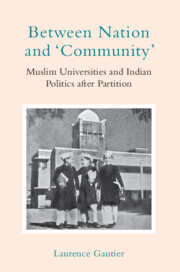Book contents
- Frontmatter
- Dedication
- Contents
- List of figures
- List of tables
- Acknowledgements
- A note on transliteration and translation
- List of abbreviations
- Introduction
- 1 A laboratory for composite India: Jamia Millia Islamia around the time of partition
- 2 Sifting Sir Syed’s legacy: From the ‘arsenal of Muslim India’ to a symbol of India’s national integration?
- 3 Re-legitimising minority rights: The campaign for Aligarh Muslim University’s minority status
- 4 Resisting minority politics, holding on to composite nationalism: Jamia Millia Islamia in the post-Nehruvian period
- 5 Uplifting backward Muslims: The new consensus?
- 6 Bastions of Islam: The defence of Islam as a narrative of empowerment and contestation
- 7 Women in Muslim universities: Guardians of tradition or actors of change?
- Conclusion
- Appendix
- Glossary
- Bibliography
- Index
7 - Women in Muslim universities: Guardians of tradition or actors of change?
Published online by Cambridge University Press: 15 April 2024
- Frontmatter
- Dedication
- Contents
- List of figures
- List of tables
- Acknowledgements
- A note on transliteration and translation
- List of abbreviations
- Introduction
- 1 A laboratory for composite India: Jamia Millia Islamia around the time of partition
- 2 Sifting Sir Syed’s legacy: From the ‘arsenal of Muslim India’ to a symbol of India’s national integration?
- 3 Re-legitimising minority rights: The campaign for Aligarh Muslim University’s minority status
- 4 Resisting minority politics, holding on to composite nationalism: Jamia Millia Islamia in the post-Nehruvian period
- 5 Uplifting backward Muslims: The new consensus?
- 6 Bastions of Islam: The defence of Islam as a narrative of empowerment and contestation
- 7 Women in Muslim universities: Guardians of tradition or actors of change?
- Conclusion
- Appendix
- Glossary
- Bibliography
- Index
Summary
In their report on the ‘social, economic and educational status of the Muslim community in India’, the Sachar Committee (2004–2006) noted:
Women in general are the torchbearers of community identity. So, when community identity is seen to be under siege, it naturally affects women in dramatic ways. Women, sometimes of their own volition, sometimes because of community pressure, adopt visible markers of community identity on their person and in their behaviour. Their lives, morality, and movement in public spaces are under constant scrutiny and control.
The members of the committee thus hinted at the importance of context in defining women's role vis-à-vis their community. They suggested that Muslim women are more likely to act as guardians of community identity—either out ‘of their own volition’ or ‘because of community pressure'—at a time when large sections of India's Muslim population feel discriminated against. By adopting ‘visible markers’, women come to embody a community identity to be protected from external interference. In this type of context, any attack against women's visibly Muslim markers quickly comes to be seen as an attack upon the entire community. The recent row on the hijab ban in Karnataka (2022) is a good case in point.
Projecting women as guardians of community identity reinforces, in turn, the notion of the ‘Muslim woman’. Be it in the media or in political discourses, Muslim women in India and elsewhere are often projected as a homogeneous category—‘oppressed and often shrouded in a stifling burqa’. These images then feed into equally homogenising notions of Islam. To counter these (mis)representations, scholars have for a long time challenged the monolithic conception of the Muslim woman. In her anthropological study in Delhi's Zakir Nagar (near Jamia), Nida Kirmani stresses the need to examine how gender and religious identity ‘continuously form and re-form along with various other identities’, thus highlighting the ‘contextual nature’ of these identities. Before her, already, several scholars insisted on the need to take into account socio-economic factors, such as education or employment, in order to understand the living conditions of Muslim women in India.
- Type
- Chapter
- Information
- Between Nation and ‘Community'Muslim Universities and Indian Politics after Partition, pp. 335 - 405Publisher: Cambridge University PressPrint publication year: 2025



